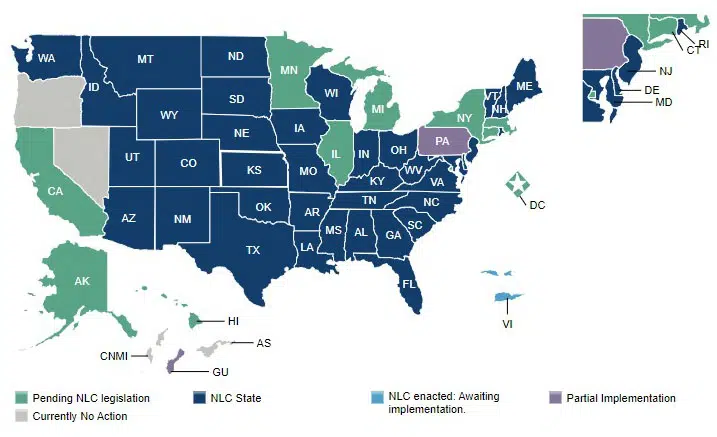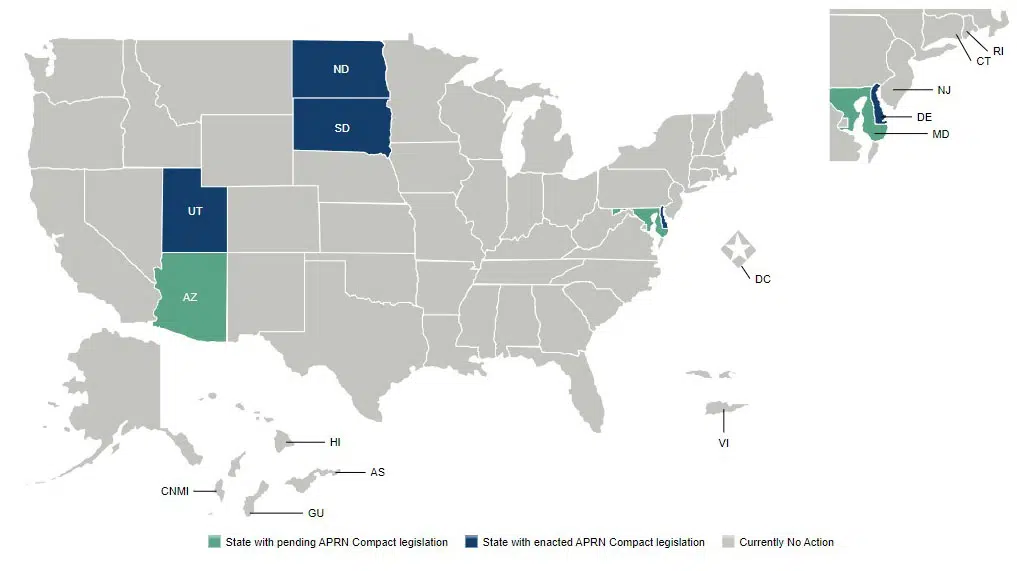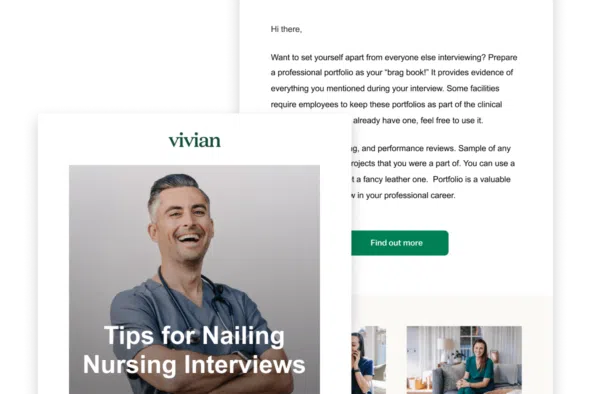Historically, nurses wanting to practice in multiple states had to apply and pay for single-state licenses in every state where they’d be providing care. The goal of licensure compacts is to eliminate the cost and time required to apply for nurse licensure in more than one state. Eliminating these hurdles allows qualified nurses to practice in numerous states with one multistate license.
However, there’s a difference between the Enhanced Nurse Licensure Compact (eNLC) and the Advanced Practice Registered Nurse (APRN) Licensure Compact. Understanding this difference is crucial for advanced practice nurses. This guide dives into both Compacts, including how they work and why the APRN Compact has stalled. We also touch on Compacts for other healthcare professionals to provide insight into who can practice across state lines.
How Does the eNLC Work?
The Enhanced Nurse Licensure Compact, developed by the National Council of State Boards of Nursing (NCSBN), is an interstate compact that allows qualifying RNs and LPN/LVNs to obtain one multistate license in their primary state of residency and practice in their home state and all other member states. Unless they’re under restriction, nurses with a Compact license may practice physically and electronically through telehealth based on each state’s practice laws.
States wanting to become member states must enact the eNLC model language into law. They must also be able to conduct fingerprint-based federal criminal background checks on nurses when they initially apply for licensure by exam or endorsement.
State nursing boards in Compact states must participate in a national database — Coordinated Licensure Information System or Nurses License Verification database — to share information with other state nursing boards regarding nurse discipline, licensure verification and practice privileges.
Nurses wanting to apply for a multistate license must meet the uniform licensure requirements, which include the following:
- Graduate of a qualifying nursing education program
- Pass an English proficiency exam if English isn’t the applicant’s native language or the nursing program wasn’t taught in English
- Pass the NCLEX-RN or NCLEX-PN or predecessor exam
- Meet their home state’s nurse licensure qualifications
- Have (or eligible to have) an active, unencumbered nursing license
- Submit to state and federal fingerprint-based criminal background checks
- Have a valid United States Social Security number
- Have not been convicted or found guilty of a felony or a nursing practice-related misdemeanor
- Disclose current participation in an alternative program
- Not currently participating in an alternative program
Nurses qualifying for a multistate license must adhere to the Nurse Practice Act in each state of practice. When providing care over the phone or electronically via telehealth, the state of practice is where the patient is located, not the nurse. Currently, RNs and LPN/LVNs holding a Compact license can practice across borders in 38 states, with three more states or U.S. territories in the process of fully implementing the eNLC.
Map of Nurse Licensure Compact States (April 2024)
Source: NCSBN (4/25/2024)
How the APRN Compact Works
The APRN Compact, also developed by the NCSBN, is very similar to other medical and nursing licensure compacts. It allows CNPs, CMNs, CNSs and CRNAs to hold one multistate license and practice physically or via telehealth in other states that have enacted the Compact without obtaining additional licenses. Like the eNLC, states wanting to join the APRN Compact must enact the APRN Compact model legislation and implement a federal criminal background check for licensure.
APRNs must also meet uniform licensure requirements, like RNs and LPN/LVNs under the eNLC. The requirements under the APRN Compact are similar but have some key differences. Those requirements include the following:
- Graduate from an accredited graduate-level education program that prepares them for one of the four recognized APRN roles
- Pass an English proficiency exam if English isn’t the applicant’s native language or the nursing program wasn’t taught in English
- Pass a national certification exam measuring APRN, role and population-focused competencies and maintaining continued competence as proven through recertification
- Pass the NCLEX-RN or predecessor exam
- Meet their home state’s nurse licensure qualifications
- Have an active, unencumbered RN license and active, unencumbered authorization to practice as an APRN
- Practice 2,080 hours or more as an APRN in a role and population focus matching the applicant’s education and training (can’t include hours obtained during APRN education program)
- Submit to state and federal criminal background checks
- Have a valid United States Social Security number
- Have not been convicted or found guilty of a felony or a nursing practice-related misdemeanor
- Disclose current participation in an alternative program
- Not currently participating in an alternative program
APRNs with a multistate license may assume responsibility and accountability for patient care and practice without supervisory or collaborative agreements with physicians. They may also prescribe non-controlled substances. However, prescriptive authority for controlled substances must only occur in accordance with the state laws and regulations in the state of practice.
What’s Holding APRNs Back?
Unfortunately, the APRN Compact just can’t seem to get any traction. Adopted on August 12, 2020, the advanced nursing compact still only has four states (Utah, North Dakota, South Dakota and Delaware) that have enacted legislation to go forward with multistate privileges for NPs, CNMs, CNSs and CRNAs. It needs seven states total to join the Compact before it can actually be implemented. As of April 25, 2024, only two states (Arizona and Maryland) had pending legislation to attempt to join the APRN Compact.
Map of APRN Compact States (April 2024)
Source: NCSBN (4/25/2024)
APRNs have come up against various roadblocks, including from one of their own professional organizations. The American Association of Nurse Practitioners (AANP) opposes the revised APRN Compact because the group is against including practice hours as a prerequisite to applying for a multistate APRN license. It believes this directly conflicts with the Consensus Model for APRN Regulation and creates unnecessary and costly regulations for all states.
The AANP has been instrumental in securing full practice authority for NPs and finalizing over 100 state statutes benefiting NPs and their patients. Without this esteemed organization’s endorsement, the NCSBN could face an uphill battle in getting the advanced practice compact implemented and accepted by more states.
A second objection to the APRN Compact comes from various quarters and directly relates to how the APRN Compact will be governed. As written, once the Compact becomes operational, each state that adopted it has an administrator who serves on the Compact Commission to represent their jurisdiction and help govern the Compact. Based on the Compact language, this representative would be the head of the state licensing board or their designee. The objection is these administrators should be APRNs and many of the heads of the state licensing boards aren’t APRNs.
APRNs Can’t Practice Under an eNLC License
The most significant thing to note is that APRNs can’t apply for a multistate license under the eNLC and practice as an APRN across state lines. Advanced practice professionals practice under different rules than registered or practical nurses with advanced capabilities and authority. The eNLC applies to RNs and LPN/LVNs only.
All CNPs, CNMs, CNSs and CRNAs must wait until the APRN Compact is fully implemented before applying for a multistate license if they qualify and live in a participating state. APRNs interested in advocating for the APRN Compact can access a customizable letter to send to lawmakers on the NCSBN advocacy site.
What Is an Occupational Licensure Compact?
Occupational licenses safeguard the public from receiving services from unqualified practitioners. Licensure is especially important in the medical field, where practitioner mistakes can have dire consequences on a person’s health and life. However, inconsistencies arise because each state has different licensure requirements for healthcare professionals. This challenge is where interstate compacts, also called universal licensure, come into play.
Occupational Licensure Compacts create reciprocal professional licensing between states while continuing to protect public safety and state sovereignty. Interstate compacts offer an efficient way to eliminate state borders and allow licensed professionals to practice in any participating state, with the ultimate goal being the ability to practice anywhere in the United States.
The most robust occupational licensure compacts provide mutual recognition, meaning if a practitioner holds a multistate license in one Compact state, they can practice in all Compact states. Alternatively, a Compact may take an expedited licensure approach. In this format, individuals must still obtain licensure in individual states, but the process is much quicker due to data centralization and coordinated application requirements.
According to the National Center for Interstate Compacts, 15 professions have Occupational Licensure Compacts available to them, with three more in development. Many of these occupations are in the healthcare industry and 49 states or territories participate in one or more Compacts. As of April 25, 2024, healthcare professionals in the following occupations had access to some type of Occupational Licensure Compact.
| Compact Name | Qualified Healthcare Professionals | # Participating States & Territories |
| Interstate Medical Licensure Compact (IMLC) | Physicians | 32 States, D.C. and Guam (Member states serving as State of Principal License) 3 States (AL, CT & VT – Member states issuing licenses only) 5 States (FL, HI, MO, PA & RI – Passed with implementation in process or delayed) |
| Enhanced Nurse Licensure Compact (eNLC) | Registered Nurses (RNs) Licensed Practical/Vocational Nurses (LPNs/LVNs) |
38 States fully implemented PA and Guam partially implemented U.S. Virgin Islands enacted, awaiting implementation |
| Advanced Practice Nurse Compact (APRN Compact) | Certified Nurse Practitioners (CNPs) Certified Nurse Midwives (CNMs) Clinical Nurse Specialists (CNSs) Certified Registered Nurse Anesthetists (CRNAs) |
4 States |
| Emergency Medical Service Officials Licensure Compact (EMS Compact) | Emergency Medical Technicians Paramedics |
24 States (16 full compliance, 1 partial compliance and 7 member pending license data) |
| Physical Therapists Licensure Compact (PT Compact) | Physical Therapists Physical Therapist Assistants |
36 States (30 fully implemented and 6 enacted but pending implementation) |
| Psychology Interjurisdictional Compact (PSYPACT) | Psychologists | 38 States, D.C. and the Commonwealth of the Northern Mariana Islands participating 2 State (SD & VT – Enacted not yet effective) |
| Audiology and Speech-Language Pathology Interstate Compact (ASLP-IC) | Audiologists Speech-Language Pathologists |
31 States |
| Occupational Therapy Interstate Licensure Compact (OT Compact) | Occupational Therapists Occupational Therapist Assistant |
28 States |
| Counseling Interstate Licensure Compact (Counseling Compact) | Licensed Professional Counselors Licensed Mental Health Counselors Licensed Professional Clinical Counselors (Doesn’t cover therapists, psychologists or social workers) |
34 States (AZ effective 7/3/24; SD effective 7/1/24; VT effective 7/1/24) |
| Social Work Licensure Compact (SW Compact) | Social Workers Clinical Social Workers Licensed Independent Clinical Social Workers Masters in Social Work |
9 States |
| Dentists and Dental Hygienist Compact (DDHC) | Dentists Dental Hygienists |
7 States |
| Interstate Massage Compact (IMpact) | Massage Therapists | 1 State (Nevada) |
Other compacts currently in the works include the:
- Respiratory Therapy Licensure Compact for Respiratory Therapists
- Dietitian Licensure Compact for Registered Dietician Nutritionists (Nebraska has enacted this Compact)
- Interstate Compact for School Psychologists for School Psychologists
How Are Licensure Compacts Beneficial?
Multistate licenses significantly relieve the financial burdens and other hassles of obtaining and maintaining licenses in multiple states. However, the benefits of multistate licenses impact not only the practitioner but also the licensure boards and even consumers.
Common benefits for practitioners:
- Streamlined licensure requirements
- Increased ability for practitioners to practice across states
- Improved portability for military spouses who often relocate every 2 years
- Increased ability to provide care through telehealth
- Reduced expenses related to obtaining/maintaining single-state licenses
- Increased ability to obtain travel healthcare jobs
Benefits for state licensure boards:
- Reduced administrative costs
- Increased ability to share complaint and investigative information
- Shared responsibility for patient safety and commitment to improving patient protection
- Continued ability to maintain control over the state Practice Act and licensure process
- Added authority to request FBI criminal background checks
Consumer benefits:
- Increased access to care
- Elevated efficiency in the distribution of services
- Increased availability and choice of qualified practitioners
- Enhanced safety standards
- Improved response during disasters, pandemics or other crises that require a higher level of medical care
- Increased ability to receive care through telehealth
Whether you’re moving permanently or taking a temporary travel job, find your next healthcare role on Vivian Health’s comprehensive jobs marketplace today.








